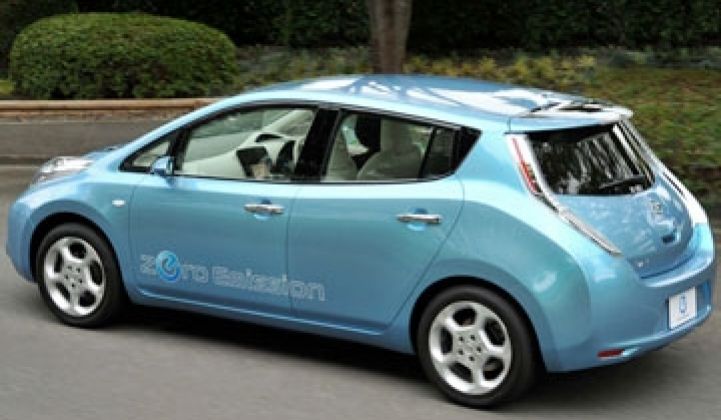For Electric Transportation Engineering Corp. (eTec), boom time has returned once again.
The Phoenix company, which boasts having taken part in "every electric vehicle initiative in North America since the 1990s," will lead a massive electric car charging demonstration project that involves roughly 40 companies, utilities and government agencies and spans five states
Earlier this month, the U.S. Department of Energy awarded eTec $99.8 million for carrying out the project. The company received the largest award for a charging technology deployment project, which sets out evaluate consumer behavior in operating and charging electric cars.
The data would be valuable for automakers, utilities and charging network developers to figure out the dos and don'ts of commercializing their technologies and managing power consumption.
Now eTec is in line to get $8 million from the California Energy Commission to fund the California portion of the project, Colin Read, vice president of corporate development at Ecotality, eTec's parent company, said Monday.
"There has never been a deployment of this scope, with cars and infrastructure," Read said, referring to the five-state project. "This will dictate the success of electric vehicles and how they will be adopted by consumers."
The energy commission released a list of award winners of the Alternative and Renewable Fuel and Vehicle Technology Program late Friday. Other recipients include the Sacramento Municipal Utility District, which will receive three grants of $756,500 total to deploy charging network demonstrations with Ford, General Motor and Chrysler.
ETec does the research, development and testing of advanced car and battery technologies, including electric to hydrogen vehicles. The company has developed a device for fast-charging electric vehicles, though so far it has found customers mostly in airlines that use the chargers for their ground equipment.
The company has won contracts to work for state and federal agencies, including the DOE's Advanced Vehicle Testing Activity program run by the Idaho National Laboratory and the National Renewable Energy Laboratory.
ETec developed and installed charging devices for General Motor's EV-1, which was launched in the late 1990s as an attempt by a major carmaker to popularize electric cars. GM gutted the EV-1 program in 2002 when it decided that the program didn't take off as quickly as it had anticipated. Plus, GM and other carmakers won a court victory that overturned a California mandate to produce zero-emission cars.
ETec also built charging stations for demonstration projects by Chrysler when it launched its EPIC electric car program in the 1990s, Read said.
This time around, eTec will be working with Nissan.
The company plans to start the project later this year, after it has finalized its award contracts with the DOE and the California Energy Commission. ETec expects to finalize the negotiations in October this year.
After that, eTec will have some lengthy discussions with its 40-some partners to map out the specifics of the charging device deployment and data collection, Read said.
The three-year project would run through the third quarter of 2012, but the goal is to deploy at least 12,750 charging stations in Arizona, California, Oregon, Tennessee and Washington by the third quarter of 2011, Read said.
The project would involve up to 5,000 units of the Nissan Leaf, which the automaker plans to launch next year. The public funding wouldn't go to buying these cars, Read said. Instead, buyers of the Leaf would be asked to sign up for the charging technology project. Those who sign up would get a free charging device installed at his or her home and allow eTec to collect data.
About 2,550 charging devices would be installed in each of the five states. About 1,000 would be set up at the homes of Leaf owners. Another 1,500 would be set up at parking lots, shopping malls, other businesses and highway corridors. Finally, 50 fast chargers would be installed in public and commercial properties as well.
The project in California would take place in the San Diego region and includes San Diego Gas & Electric as a partner. With the Energy Commission's funding, the state would get even more charging stations than the 2,550 allotted through the federal funding. But Read said that number won't be disclosed until the company finalizes its contract with the state.
Although eTec has its own charging technology, it has lined up Coulomb Technologies for the project. Coulomb, based in Campbell, Calif., has engineered a charging device and software for billing customers and for utilities to monitor electricity use by the charging networks.
The Oakridge National Laboratory also is part of the consortium and plans to contribute a solar-charging device it has developed, Read said.
Organizing the project and coordinating its deployment among so many public and private partners will not be easy for eTec. If successful, however, it will help to speed up the mass adoption of electric cars.
Picture of the Nissan Leaf via Nissan.



